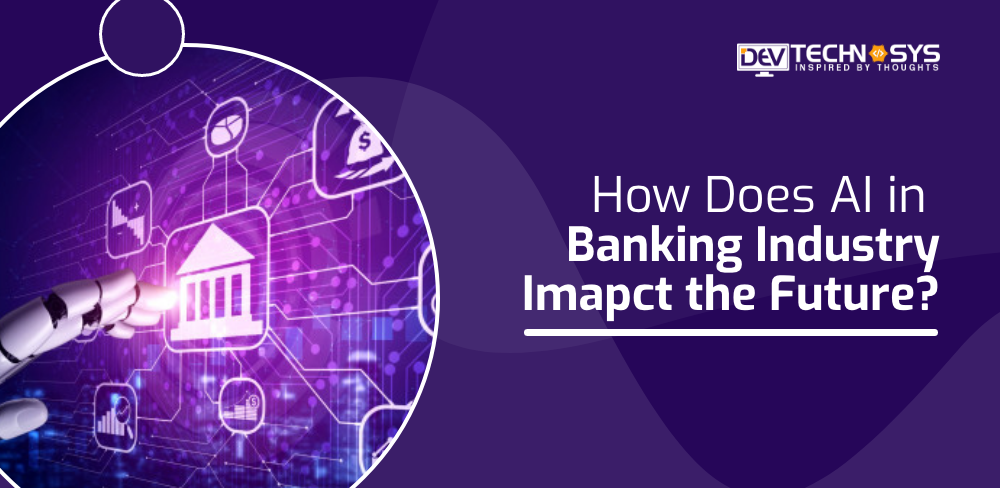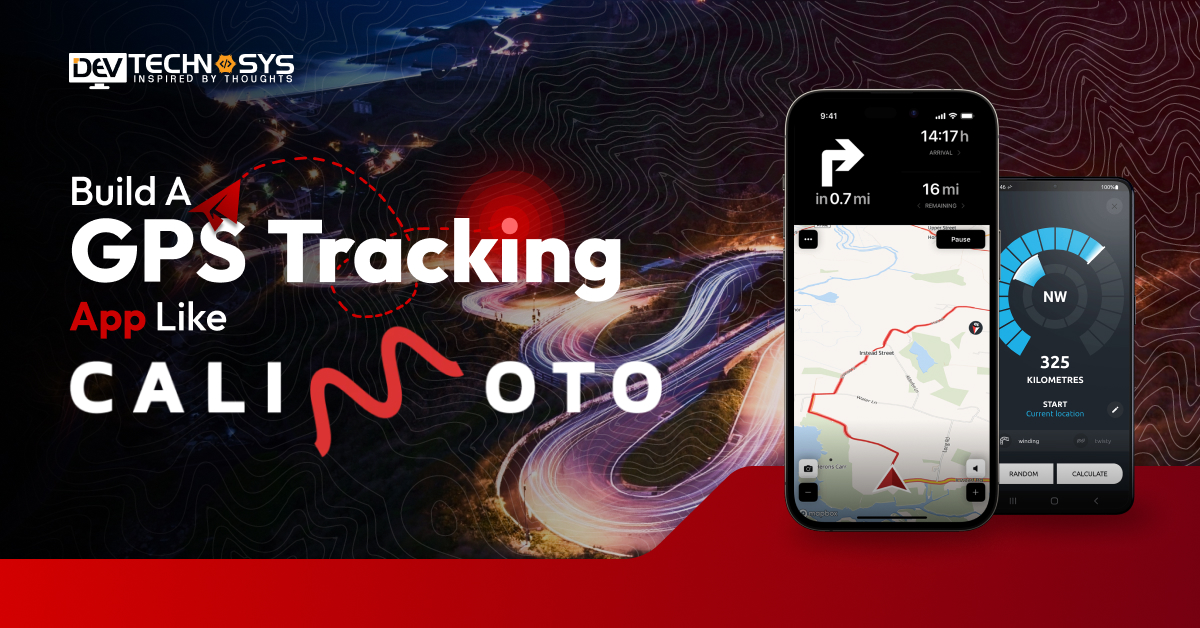“The convergence of AI and finance is not just a trend; it’s a necessity for staying competitive in the banking industry.”
– Henry Kravis
Artificial Intelligence has become a powerful force in the rapidly changing world of finance. It is reshaping banking’s contours. This blog explores the fascinating topic of “How Does AI in Banking Industry Impact the Future?” As we explore the intersection of technology, finance and more.
AI is more than a buzzword. It’s a dynamic technology that is revolutionizing banking practices. AI streamlines operations, enhancing efficiency and streamlining financial institutions’ operations.
Discover with us the many ways AI is shaping banking’s future. We will explore the impact of chatbots on customer interaction, the role of AI and machine learning in banking algorithms in risk management, and the implications of data-driven decisions.
What is AI in Banking Industry?
Artificial intelligence (AI) in banking refers to the automation and enhancement of different areas of financial services via the application of artificial intelligence technologies such as neural networks, natural language processing, and data analytics.
The use of chatbots for customer service, AI in banking fraud detection, credit assessment, personalized financial advice, and optimization of operational processes are all part of this.
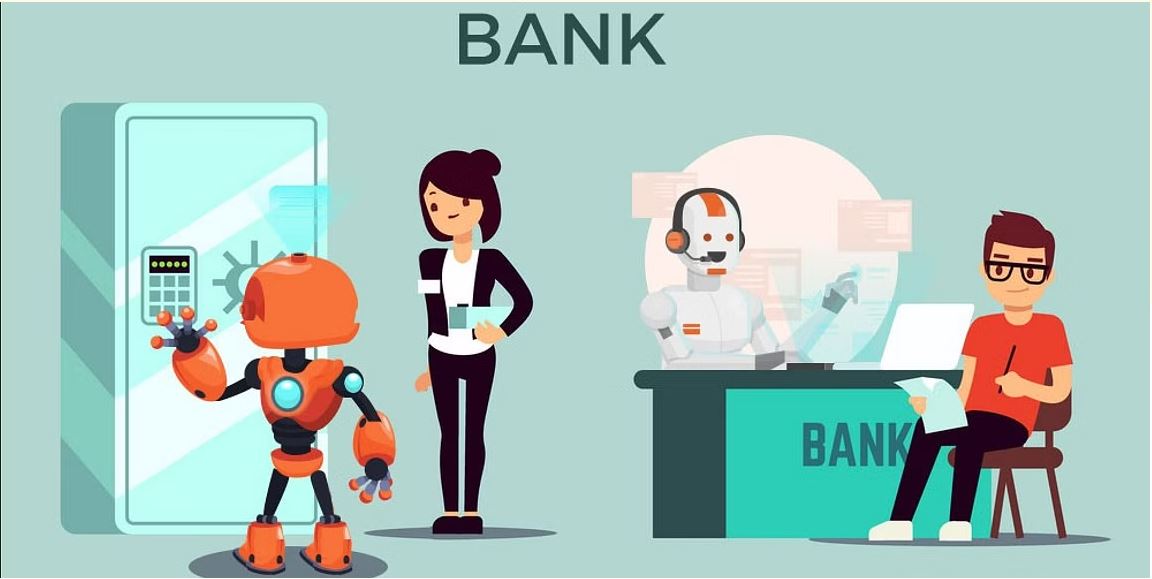
AI can help banks improve efficiency, reduce costs and offer better customer experiences through the analysis of vast amounts of data and data-driven decision making.
This tool is also a valuable asset for modern banking, as it helps to ensure compliance and security by identifying potential threats and anomalies in real time. So, if you are planning to invest in banking apps with AI technology, then you must consult with a mobile banking app development company.
AI in Banking Market Statistics
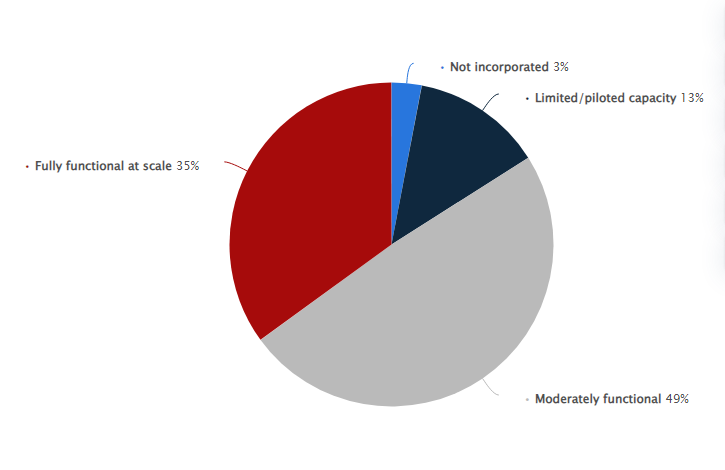
- A third of respondents claimed to have fully integrated artificial intelligence technology into their business.
- The global AI market in banking is expected to grow at a CAGR of 32.1% from $6.82 Billion in 2022 up to $9.00 Billion in 2023.
- By 2030, AI will be used in banking to generate around US$99 billion in Asia Pacific.
- Then, predictive analytics and virtual assistants were the next most popular technologies with 60 percent and 58 percent respectively.
- North America will account for more than 37% share of revenues in 2022.
- In 2019, Bank of Georgia launched a new retail banking system powered by AI.
How AI Is Transforming The Banking Sector?
In a matured market, only a few things separate one institution from another. AI has thrown this race wide open. The banks are in an ideal position to use AI to gain a competitive edge, offer attractive products and increase their customer base. A survey found that 77% of respondents agreed that the ability of banks to harness the full potential of AI was key to their survival.
Banks can enhance their strategies through cloud infrastructure, security, and storage optimization. Artificial intelligence adoption, particularly with large-scale language models, improves customer experience.
For example, Deutsche Bank leverages AI in their app through a Banking mobile app development company to aid customers in portfolio management, providing valuable recommendations based on risk factors.
Top 5 Examples of AI Applications in Banking
There are multiple AI banking apps in the market that are doing great, but we have listed the top 5 best apps recommended by a mobile app development services provider. So let’s have a look:
AI Banking Apps |
Available Platforms |
Download |
Ratings |
| Chime | Android | iOS | 10M+ | 4.8 |
| M1 Finance | Android | iOS | 1M+ | 4.5 |
| Ally | Android | iOS | 1M+ | 3.5 |
| Simple | Android | iOS | 1M+ | 3.1 |
| Qapital | Android | iOS | 500k+ | 4.4 |
1. Chime:
Chime, an AI-powered Neobank, offers a wide range of banking products and services that are centered around financial wellness. The app analyzes users’ spending habits and gives them insights into their financial habits using AI.
The banking app like Chime offers round-up saving, which automatically saves or invests spare change after purchases are rounded to the nearest dollar.
2. M1 Finance:
M1 Finance, a robo advisory platform, uses AI to automate investment services. Users can create and manage portfolios according to their financial goals and tolerance for risk.
This is one of the best mobile banking apps that uses intelligent algorithms to automatically rebalance investment portfolios in order to maintain asset allocations. The app also offers Smart Transfers which automatically move excess cash to investments.
3. Ally:
Ally is a virtual assistant powered by AI developed by Ally Bank to improve customer interaction. This app uses Natural Language Processing (NLP) to understand and answer customer queries.
Users can receive financial insights, ask questions, make transactions and get personalized answers. This artificial intelligence in finance makes it easier for customers to navigate the app, giving them a more intuitive and seamless experience.
4. Simple:
Simple uses AI to analyze spending patterns and provide personalized insights for users. ai in investment banking approach helps customers optimize their finances by making it easier for them to save money, budget and reach their financial goals.
However, you can Create an AI App like Simple with AI technology to expand your business. Simple’s ability to understand users’ behavior and provide tailored recommendations demonstrates AI’s power in improving financial wellbeing.
5. Qapital:
Qapital is an AI-driven saving app. Artificial intelligence and behavioral sciences are used to help users save money more efficiently. Qapital lets users set their own personal savings goals and rules.
It can, for example, round your daily transactions up to the nearest dollar automatically and save any spare change. It can also analyze your spending habits and suggest ways to save money more efficiently. So, if you want to develop an app like Qapital, then you must hire mobile app developers who are proficient in app development.
Challenges in Adopting AI in Banking Industry
Widespread implementation of high-end technologies like AI does not come without its challenges. There are many challenges for banks that use generative AI in banking industry technology, ranging from a lack of quality and credible data to security concerns.
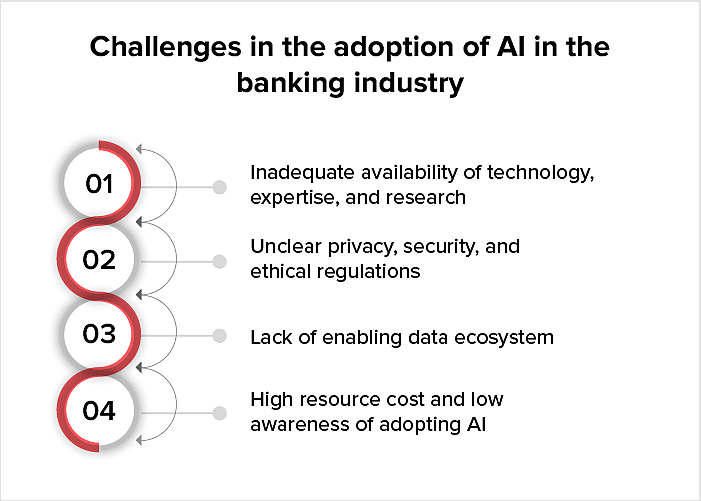
Let’s look at some of them now.
-
Data Security
To avoid breaches or violations, the amount of data collected by the banking industry must be adequately secured. It is therefore important to find a technology partner that is knowledgeable about AI and banking and can offer a variety of security options in order to protect your customer data.
-
Lack of Quality Data
Before businesses deploy AI solutions, they need to use structured and high-quality data for validation and training. To ensure that the algorithm is applicable to real-life scenarios, they need to use quality data.
It is vital to hire AI developers and is essential for organizations looking to address issues related to unstructured or non-machine-readable data. These experts play a critical role in ensuring data is properly processed and compliant with privacy policies, thereby mitigating potential AI model behavior risks and facilitating the accelerated adoption of AI technologies.
-
Lack of Explainability
AI-based systems can be used to make decisions as they reduce errors and save time. They may, however, adopt biases based on previous instances of poor judgment. Minor AI system inconsistencies can quickly escalate to large-scale issues, putting the bank’s reputation at risk.
Banks should provide a level of explanation that is appropriate for all AI model decisions and recommendations. This will help to avoid catastrophes. Banks must understand, validate and explain the decisions made by AI models.
Benefits of AI in Banking Industry
After integrating AI in their back-end and customer-facing processes, banks have already seen substantial benefits. They include:
-
Better decision-making:
AI-enabled insights help bankers, fund managers and other financial stakeholders make better decisions. They use AI to minimize risks and maximize opportunity in volatile market conditions.
-
Personalized Customer Experiences:
No longer do customers have to wait long for assistance or receive generic product offers. They are instead attended to quickly and have access to tailored information on all digital channels, including apps, websites, and websites.
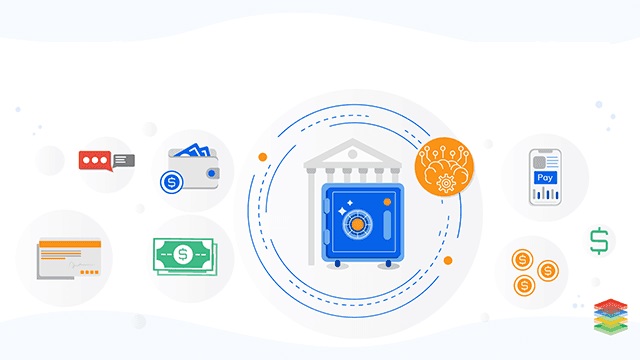
-
Improved Efficiency:
AI technology allows financial institutions to scale their operations and eliminate bottlenecks that hamper manual processes. AI development services systems automate repetitive and resource-intensive tasks. This allows the bank staff to provide more value to their customers.
-
More Robust Security:
AI helps financial institutions protect their customers’ data from risks. AI allows banks, simultaneously, to be agile in responding to online threats. It can spot and stop fraudulent activities instantly.
-
Improved Risk Management:
AI improves risk management by analyzing the wealth of financial data. Instead of rushing into a decision to protect assets, bankers use predictive insights to navigate challenges and take advantage of market opportunities.
-
AI-assisted Regulatory Compliance:
AI-assisted compliance with regulatory requirements: Banks continuously evaluate their commitment to meet regulatory requirements. AI systems automate the tasks that were previously performed by bank officers. This helps institutions to reduce costs and avoid heavy penalties.
-
Improved Privacy:
AI makes customers feel more secure and comfortable. Customers can opt to not divulge any personal information and ask for the removal of all conversational data.
Uses of AI in Banking Industry
You must be thinking how is AI used in banking? Well, Artificial Intelligence is revolutionizing banking in many ways. It improves efficiency, security and customer experience. As per the Fintech App development company, below are the uses of AI in banking and finance and shed light on the impact of AI.
1. Personalized Customer Experiences
The AI chatbots in banking and virtual assistants have revolutionized the way banks interact with their customers. These smart technologies employ natural language processing to comprehend consumer inquiries and offer 24/7 individualized support.
AI can help banks recommend tailored financial services and products by analyzing customer data and historical behavior. This improves both customer satisfaction and cross-selling opportunities.
For robust implementations, businesses often collaborate with specialized entities, such as a Chatbot app development company, to create advanced and tailored solutions for their unique needs.
2. Fraud Detection and Prevention
AI algorithms are able to detect fraudulent activity by analyzing large amounts of transactional data in real time. Machine learning models can learn from past fraud patterns and enable banks to detect suspicious behavior quickly.
Fraud detection using AI in banking systems can flag up unusual transactions and help banks to prevent fraudulent activities and unauthorized access. They protect both the institution as well as its customers.
3. Credit Risk Assessment
In the past, creditworthiness assessment relied on manual processes. AI, aided by machine learning, has streamlined this by analyzing diverse data, including social media. A machine learning app development company created these models, enabling banks to swiftly and accurately evaluate credit risk, facilitating faster and well-informed lending decisions.
4. Algorithmic Trading
AI-driven algorithms have reshaped the trading landscape within banking. These algorithms assess AI trends and perform transactions at a pace and accuracy that is unattainable for human traders using market data, past transactions, and news. Trading systems with AI capabilities enhance portfolios, improve risk management, and maybe boost profits.
5. Robotic Process Automation
RPA bots automate repetitive, rule-based tasks in banking operations. These robots automate repetitive tasks such as data entry, reconciliation and report generation. This allows human employees to concentrate on more complex, value-added tasks. This reduces costs and minimizes errors. It also leads to greater accuracy and compliance.
6. Predictive Analytics for Customer Insights
AI-driven predictive analytics uses data to predict customer preferences and behavior. This information can be used by banks to create targeted marketing campaigns, and personalize product recommendations. Understanding the needs of customers allows banks to improve customer retention and satisfaction. This ultimately drives profitability.
7. Regulatory Compliance and Anti-Money Laundering
Banks are constantly challenged to meet stringent regulatory requirements. AI is essential for streamlining the audit process by looking for questionable trends in transactional data that might point to fraud or money laundering. These systems help banks not only stay compliant but also reduce false-positives, saving both time and resources.
Future of AI in Banking Industry
Digital technology has a profound impact on almost all industries. It not only changes the industry but also how businesses are run. In this tech-driven environment, every industry is analyzing and implementing options.
Digitalization is a global phenomenon, and it is driving the growth of the banking industry. The question is now how can the banking industry assist more customers without increasing costs?
Industry must adapt to the changing needs of customers. Today’s customers have very high expectations. Customers today are digitally savvy and expect that industries will provide them a pleasant, comfortable experience. They also expect the same from the banking industry.

In order to meet customer expectations, the banking industry has extended its reach in the retail, IT and telecom sectors, providing services such as mobile banking, real-time money transfers, and e-banking. The banking sector pays a price for these advanced features that allow customers to have banking at their fingertips.
It is more likely that confidential information will be transferred over virtual networks due to the involvement of IT, retail, and telecom. It can sometimes lead to cyber-attacks or fraud in the banking industry. This type of fraud affects not only the bank’s finances but also the trust of people.
Artificial intelligence in the banking sector is primarily used to help consumers make better choices by prioritizing them. Artificial Intelligence helps ensure that customers are satisfied with bank services. AI, or machine intelligence, helps the bank understand consumer expectations.
Conclusion
AI will revolutionize banking in the near future. Its impact is far-reaching and will enhance customer experiences, improve efficiency, as well as strengthen security. AI-driven personalized services, fraud detection and predictive analytics will allow banks to manage risks efficiently while providing tailored services.
Banking’s future holds the promise of innovation, simplified procedures, and a focus on the needs of the consumer. This will bring forth a new era of banking that is both technologically advanced and customer-friendly.
However, partnering with an Artificial Intelligence App Development Company can help financial institutions harness the full potential of AI to deliver cutting-edge services and personalized experiences to their customers.
Frequently Asked Questions
1. How Much Does Mobile Banking App Development Cost?
The Mobile Banking App Development Cost can vary widely based on features, complexity, platform, and location of development. A basic app may start at $10,000, while more advanced apps with security features and integrations can exceed $30,000 or more. So, to know the exact cost to develop a mobile app, it is vital to consult with professionals.
2. How to Create a Mobile App with AI technology?
To create a mobile app, you must follow the below steps:
- Define your app’s purpose and AI use cases.
- Choose the right AI frameworks and tools.
- Collect and preprocess data.
- Develop AI models using machine learning.
- Integrate AI into your app’s code.
- Test, refine, and optimize the AI features.
3. Can AI Help with Regulatory Compliance in the Banking Sector?
Yes, AI can automate compliance checks, monitor transactions for suspicious activities, and generate reports to ensure adherence to regulations.
4. What are Some Specific Applications of AI in banking?
AI is used for credit scoring, risk assessment, algorithmic trading, chatbots, virtual financial advisors, and fraud detection, among others.
